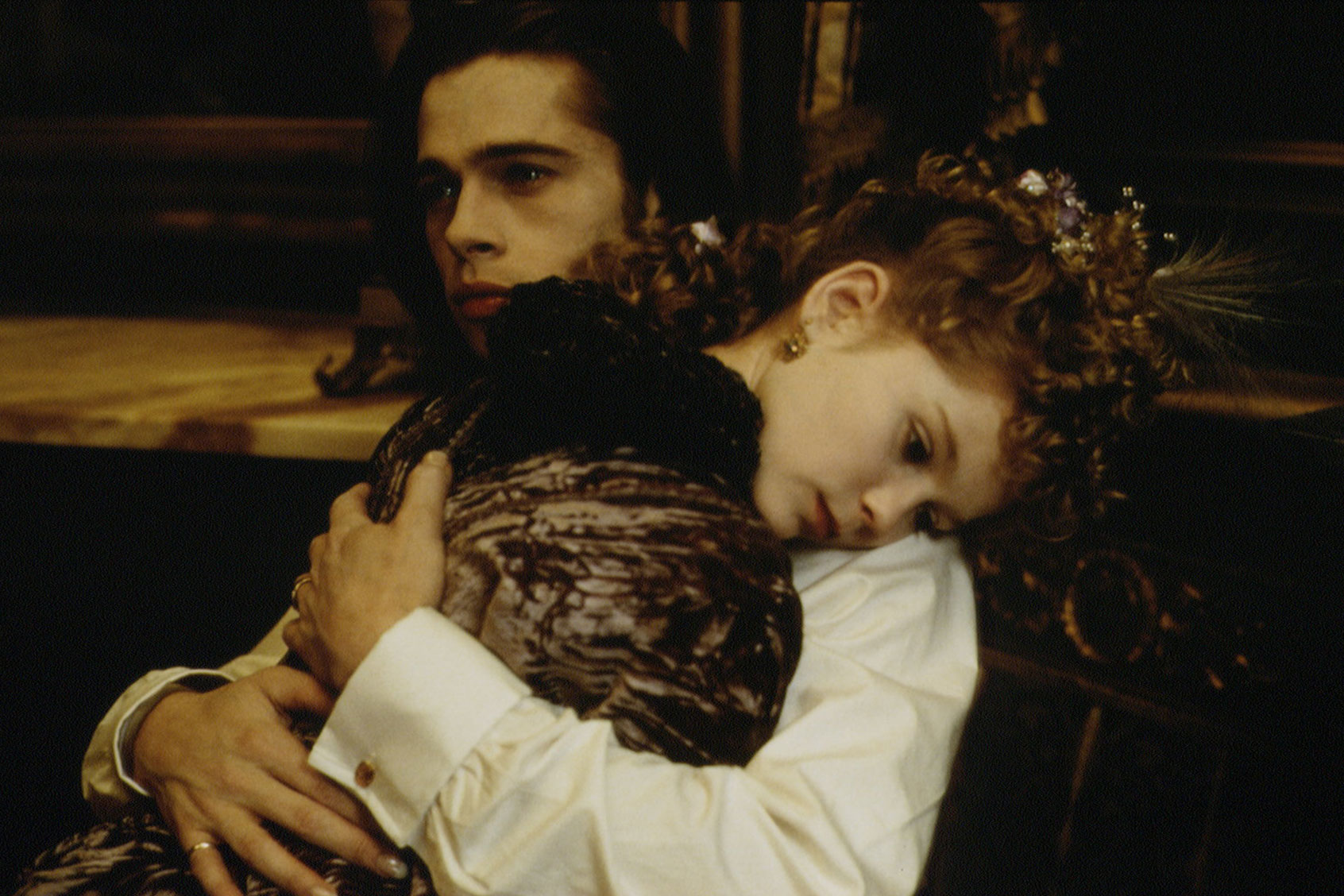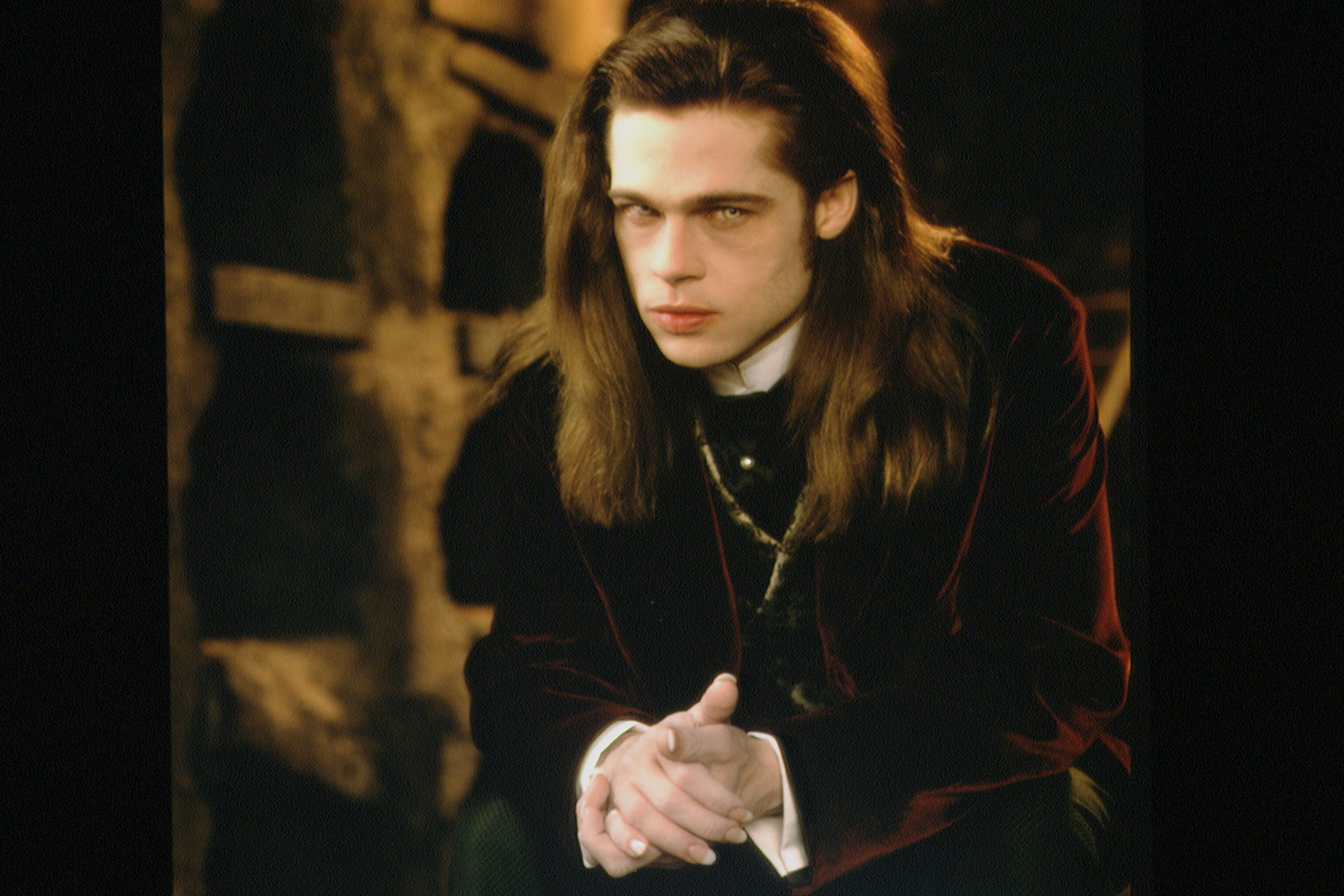Researchers have often described time as being an illusion. A social construct that we created to inventory passing days in a way that would best make sense to us when time, in and of itself, is more fluid. And while it would take a team of scientists to explain this all properly, any one of us can feel it when happy chapters of life seem to fly by, while darker ones feel like they stretch for an eternity – or when recalling the summers of youth when two months felt twice as long, compared to the seasons of adulthood where calendar pages flip over months that feel as thin as the paper they're printed on.
Rewatching a favorite film is an interesting example of the illusion of time because you could watch it on Sunday, and then again on Monday, and find yourself a completely different person when no real stretch of time had passed at all. And yet still, you're viewing it through new eyes. To mark the 30th anniversary of "Interview with the Vampire," Neil Jordan's film adaptation of Anne Rice's debut novel, I rewatched this movie that I first saw when it hit theaters in 1994 — just a high schooler at the time — and had last watched just months ago as a married woman with a dog living in New Orleans, on the brink of 50. But this time was different, closing the gap on those 30 passing years like two hands clapped together, with a lot of joy and pain trapped inside, like a buzzing fly. Between the last watch and this most recent one, there is no more marriage, just me, the dog and the reminded lesson that hope springs eternal, carrying us from one year to the next. And chasing that hope, as one of the film's main characters, Louis de Pointe du Lac (Brad Pitt) illustrates, relies on finding something to say "yes" to. Something you can follow like a rope in the dark, to give you a reason to get up in the morning or, for him, the night. For Louis, that starts out as being the offer of immortality, and then a daughter. For me, it's a dog named Dracula.
Many of us are experiencing tremendous pain right now; physical, spiritual, emotional or existential; with the weight of the world pressing down. In America, this election alone has sent an expanse of the population reeling, casting a dark cloud on the upcoming holidays and making it hard to find optimism in the face of so much doom and gloom.
Hard. But not impossible.
When I sat down to watch "Interview with the Vampire" the other night I carried inside me a sadness that I've described as feeling like cancer. A sadness worse than what I experienced after the death of my mother, my father and my grandmother. Having grown up in a small — and not that great — family unit, all I'd ever hoped for was to one day have a family all my own, however big or small, where I'd give and receive the kind of safety and love that I felt I'd been lacking for so long. But in the midst of a divorce, days away from what would have been my 10-year wedding anniversary that will now be just another Saturday, I worried that watching this movie that I had previously seen with such dewy, life-filled eyes during much happier points of my life would send me over the edge now that the grand finale future I'd envisioned for myself felt hopelessly out of reach. But thanks to Anne Rice, Louis or the red wine I was drinking out of a huge plastic tumbler at the time, it ended up being exactly what I needed, exactly when I needed it and I grabbed onto that hope again both figuratively and literally, as it was loudly snoring on the couch beside me.
 Brad Pitt and Kirsten Dunst in the film "Interview with the Vampire" (Francois Duhamel/Sygma via Getty Images)
Brad Pitt and Kirsten Dunst in the film "Interview with the Vampire" (Francois Duhamel/Sygma via Getty Images)
When we first meet Louis in the film, he's a young plantation owner mourning the loss of his wife and child. Having given up on life, he drowns his sorrows in Louisiana bars and seeks company from sex workers in an effort to throw away his money and what's left of his time, hoping there's not much left at all. Praying it so. When Lestat de Lioncourt (Tom Cruise) finds him this way, he offers to take his pain away by giving him new life as a vampire. This scene gave me pause although I'd seen it dozens of times before. Feeling a similar pain as Louis while watching, I couldn't imagine why a person so emotionally wounded as to wish for death would accept the offer of immortality, essentially prolonging that sadness endlessly. But then the phrase "This will fix me" popped in my head and I landed on a take that I hadn't ever previously in all my other times watching this. For Louis, wanting his suffering to end and then signing up for an eternity of it was basically his version of cutting his bangs in the bathroom with kitchen scissors because he couldn't think of anything else to do. He wanted something. Any kind of something. And wanting something can keep you alive. Needing something is different. Needing can come later. Find something to want and stretch towards it however you're able. It'll pull you right out of the grave.
Want a daily wrap-up of all the news and commentary Salon has to offer? Subscribe to our morning newsletter, Crash Course.
I saw an interview with Ryan Gosling many years ago where he said something that really stuck with me. I can't find it anywhere online and I don't remember it word for word but it was something about moving piles of rocks from one end of his yard to the other to pull himself out of a depression. The sentiment was basically like, get off your a** and get to it.
When I'm in the bell jar, as I majorly have been for the last two months, the more I sit around and just wallow in sadness, the worse I feel. Even if I'm cancerously blue, as I have been — am right this second — I force myself to keep going in small little ways. It may sound pathetic, but for my upcoming non-anniversary I wrote in my planner to order a pizza. I can turn to the page in my Moleskine and see it now. It's something to look forward to. Tomorrow, I have written down to mow the grass. It's something to cross off. Something to do. And every day, all day long, there's the matter of my dog. This soft, eating, pooping, peeing thing that relies on me for its total physical and emotional wellbeing. If I were to give into the darkness — and I've come close — she would follow close behind. And I don't want that. I want her to live, so I need me to live. And there will be more wants. And more needs. But you see how the ball gets rolling. One foot in front of the other. Gotta just pick something.
When Louis picks the offer of vampirism to pull himself out of his funk, he immediately regrets it. He's not willing to give up on his humanity, so the whole killing people and drinking their blood thing doesn't go over very well. But then he finds Claudia (Kirsten Dunst) a young girl clutching on to her dead mom in the midst of a plague, and with the help of Lestat, makes her his immortal daughter. Where before he cared for nothing, not even himself, now he cares for something. He cares for her.
Claudia takes to the dark gift better than he did, but when she starts to struggle with the fact that her physical form will always look like that of a child, even when she's 300 years old, he takes her back to the place where he found her so that she can fully understand the way things are and then set off to choose her own something. Find something she wants. That ends up being killing Lestat but, still, it cheers her up for a bit.
“For 30 years I’d avoided that place, yet I found my way back there with hardly an upward glance,” Louis says in a voiceover as he guides Claudia back to the home where she left one life for another.
I was amazed by the perfectness of this. Thirty years for Louis. Thirty years for me. A big spinning circle that will, one day, stop spinning.
But not yet.


